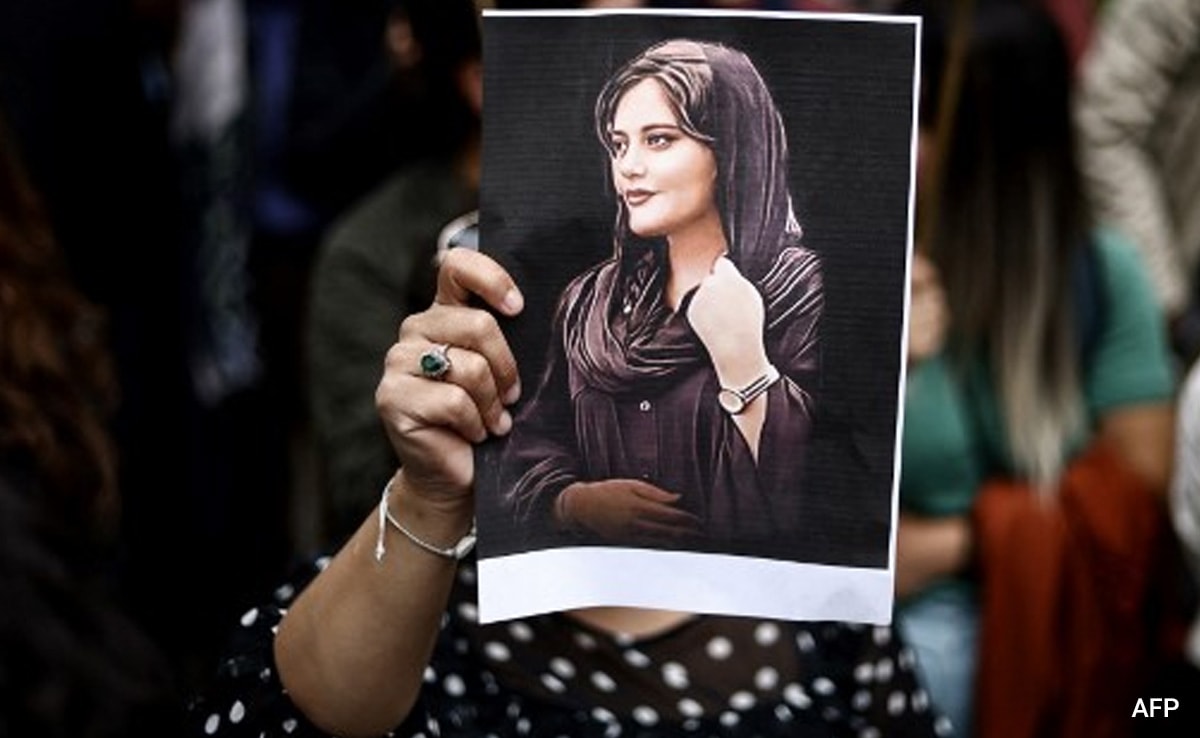
Iran saw widespread protests after the death of Kurdish Iranian woman Mahsa Amini
Tehran:
Iran’s rulers have intensified a clampdown on dissent one year since the death in police custody of Mahsa Amini sparked protests that spiralled into some of the worst political turmoil since the 1979 Islamic Revolution.
How protests erupted in Iran after Mahsa Amini’s death
Protests began soon after the September 16 death of Kurdish Iranian woman Mahsa Amini, 22, who had been arrested by morality police three days earlier for allegedly violating Iran’s mandatory Islamic dress code.
Amini, described as a shy person who minded her own business and stayed clear of politics, was detained as she stepped out of a train station in Tehran.
News of her death circulated on social media. Protests erupted at her funeral in her hometown Saqez and then spread across the country with demonstrators chanting “Woman, life, freedom” in a furious challenge to Iran’s clerical rulers.
While Amini’s family said she had been killed by blows to her head and limbs, the authorities said she had died due to existing medical problems, further fuelling anger over her death.
What protestors demanded
With women and young people often at the forefront, protesters targeted symbols of the Islamic Republic, burning pictures of Supreme Leader Ayatollah Ali Khamenei and chanting “Death to the Dictator”.
Women, including schoolgirls, took off and burned headscarves, revolting against laws obliging women to cover their hair and wear loose-fitting clothes.
The protests were particularly intense in areas home to ethnic minorities that have long faced discrimination by the state, including Kurds in the northwest and Baluchis in the southeast.
Meanwhile, a growing number of women were disregarding the dress code. After a chess player and a climber competed without wearing headscarves other prominent women defied the authorities by violating the hijab law and voicing support for the protests.
Authorities have imposed travel bans and jail terms on several public figures from athletes to actresses.
How Iran quelled protests
Security forces restricted access to messaging apps and fiercely confronted the leaderless protesters using tear gas, clubs and, in some cases, live ammunition, even as the protests rumbled on into the new year. A paramilitary volunteer militia, the Basij, played a prominent part in the crackdown.
Rights groups said over 500 people – including 71 minors – were killed, hundreds wounded and thousands arrested. Iran carried out seven executions linked to the unrest.
Authorities have not given any official estimated death count, but said dozens of the security forces were killed in the “riots”.
What Changed In Iran after Mahsa Amini’s death in police custody
Buttressed by the Revolutionary Guards, the ruling elite appears to remain deeply entrenched in power despite its initial difficulties in subduing the protests.
Morality police largely vanished from the streets after Amini died in their custody. But as the protests fizzled they returned to streets and surveillance cameras were installed to identify and penalise unveiled women.
Authorities described the veil as “one of the principles of the Islamic Republic” and ordered both private and public sectors to deny services to any women who had discarded it, temporarily closing thousands of non-compliant businesses.
But with many Iranians saying the number of unveiled women continues to grow, the parliament is considering longer prison terms for anyone who flouts the dress code and harsher penalties for celebrities and businesses that violate the rules.
Outside Iran, Western countries imposed new sanctions on security forces and on dozens of Iranian officials over the protests, further straining already difficult ties.
How Iran leaders will shore up their position
Recent actions by security forces suggested Iran’s rulers intended to brook no flicker of dissent as the anniversary of Amini’s death approached.
Activists have accused authorities of a campaign to intimidate and instil fear, arresting, questioning, threatening or firing people connected to protests.
Journalists, lawyers, activists, students, academics, artists, public figures and family members of killed protesters, especially among ethnic minorities, have been targeted in recent weeks.
Iranian officials have blamed the unrest on foreign foes, notably the U.S. and Israel, raising the stakes for anybody facing arrest.
However, in cracking down they risk widening a rift between the clerical leadership and ordinary Iranians increasingly dismayed by an economy hammered by sanctions and mismanagement, a potential source of future unrest.
(Except for the headline, this story has not been edited by NDTV staff and is published from a syndicated feed.)




